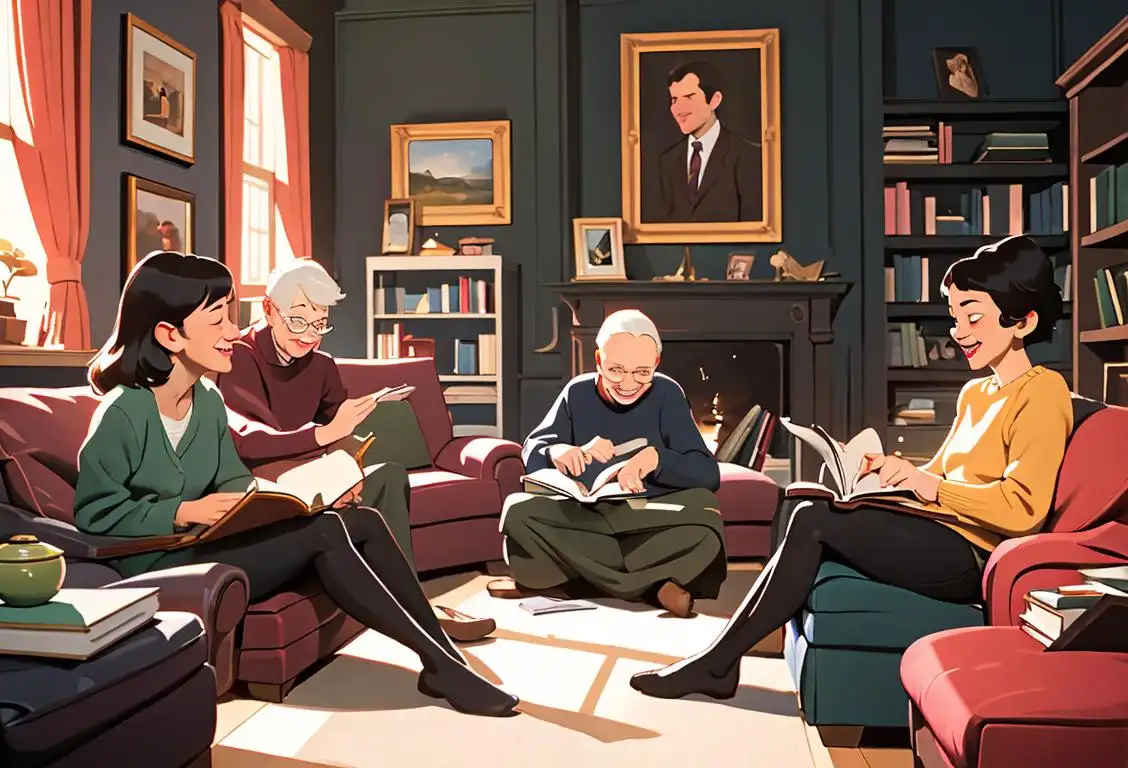National Libraries Day

What's more exciting than a library? A whole day devoted to libraries! National Libraries Day, the bibliophile's holiday, is a time to appreciate the world of knowledge quietly nestled in the corners of our communities. Roll up, gather your most whimsical bookmarks, and join us through this unseen magical literary carnival. But shhh! We're in a library.
When is Libraries Day?
It's national libraries day on the 6th February.
A Love Letter to Libraries
Thanks to the hidden nooks and crannies of our digital archives, we've gleaned that National Libraries Day has garnered a growing internet popularity over the years, peaking with 6367 mentions online on February 6th, 2016. It's clear the hallowed halls of Library Land are a beloved topic.
Passion for Pages
Imagine, a day where we not only acknowledge, but outright celebrate, the sanctuaries for academia that are our libraries. A cue to readers, writers, knowledge-seekers, and silence-lovers alike to raise their inky quills and dog-eared bookmarks in honor of our most treasured institutions. Libraries are not merely a collection of books; they are transformative spaces crafted for ideas, learning, and communities.
Why Is National Libraries Day a Thing?
Well, why shouldn't it be? Where else can you traverse through the depths of human knowledge, embark on daring adventures, and meet unforgettable characters, all without having to pay a dime? A day paying homage to these epicenters of enlightenment is hardly surprising. And speaking of free admission, let's not forget librarians, the unsung heroes of this narrative, always ready with a welcoming smile, an apt recommendation, or a stern 'Shush!'.
A Final Word
Though the internet can seemingly offer thousands of books at the click of a button, nothing beats the tangible magic of leafing through a real book in a library's peaceful ambience. So grab your library cards, or apply for one if you haven't, and get ready to dive into the endless wonder that libraries offer - not just on National Libraries Day, but every day.
History behind the term 'Libraries'
2600 BCE
Clay Tablets and Early Archives
The history of libraries can be traced back to around 2600 BCE in ancient Mesopotamia, modern-day Iraq. The Sumerians, one of the world's earliest civilizations, developed the cuneiform writing system and used clay tablets to record information. These tablets were stored in temples and royal palaces, resembling the first known archives in human history.
7th century BCE
The Royal Library of Ashurbanipal
In the 7th century BCE, during the reign of King Ashurbanipal in Nineveh (modern-day Iraq), the Royal Library of Ashurbanipal was established. This library housed a vast collection of around 30,000 clay tablets and possessed various sections dedicated to different subjects, including astronomy, medicine, literature, and more. It is considered one of the earliest known libraries, showcasing the ancient Mesopotamians' pursuit of knowledge and the preservation of written records.
3rd century BCE
The Great Library of Alexandria
One of the most famous libraries in history, the Great Library of Alexandria, was founded in the 3rd century BCE in Alexandria, Egypt. Under the patronage of the Ptolemaic dynasty, the library aimed to collect and store all the knowledge of the ancient world. It attracted renowned scholars, including mathematicians, astronomers, and philosophers, who conducted extensive research and made significant contributions to various fields. Unfortunately, the library was destroyed in multiple fires, leading to the loss of countless irreplaceable texts.
7th century CE
The Islamic Golden Age and House of Wisdom
During the Islamic Golden Age in the 7th century CE, libraries played a crucial role in the advancement of scholarship and intellectual pursuits. Caliph Harun al-Rashid established the House of Wisdom in Baghdad, Iraq, which became a center of learning and translation. Scholars from diverse cultures and backgrounds assembled here to translate ancient Greek, Persian, and Indian works into Arabic, leading to a significant preservation of knowledge and the development of innovations in medicine, philosophy, mathematics, and other disciplines.
15th century CE
The Advent of Printing Press and Public Libraries
The invention of the printing press by Johannes Gutenberg in the 15th century revolutionized the production and distribution of books. This technological advancement led to an increased availability of books and marked the start of public libraries. The Malatestiana Library in Cesena, Italy, constructed in 1452, is often considered the first public library since it was intended to serve the general public rather than a specific institution. Public libraries increased literacy rates and made knowledge more accessible to a wider population.
19th century CE
The Modern Public Library Movement
The 19th century saw the emergence of the modern public library movement. Public libraries focused on providing free access to information and promoting education for all. Notable figures like Andrew Carnegie, the American industrialist and philanthropist, funded the construction of numerous libraries in the United States and other countries. Inspired by the efforts of Carnegie, communities worldwide began establishing public libraries, contributing to the democratization of knowledge and the fostering of lifelong learning.
Did you know?
Did you know that the world's oldest library, the Library of Ashurbanipal, established in the 7th century BC, is still standing in Nineveh, Iraq!Tagged
fun community knowledge books libraryFirst identified
29th March 2015Most mentioned on
6th February 2016Total mentions
6367Other days
Libraries Day
Reading Group Day
Library Open Day
Ipa Day
Law Day
Cheese Pizza Day
Random Acts Of Kindness Day
Rum Day
Pabebewave Day
Philanthropy Day








